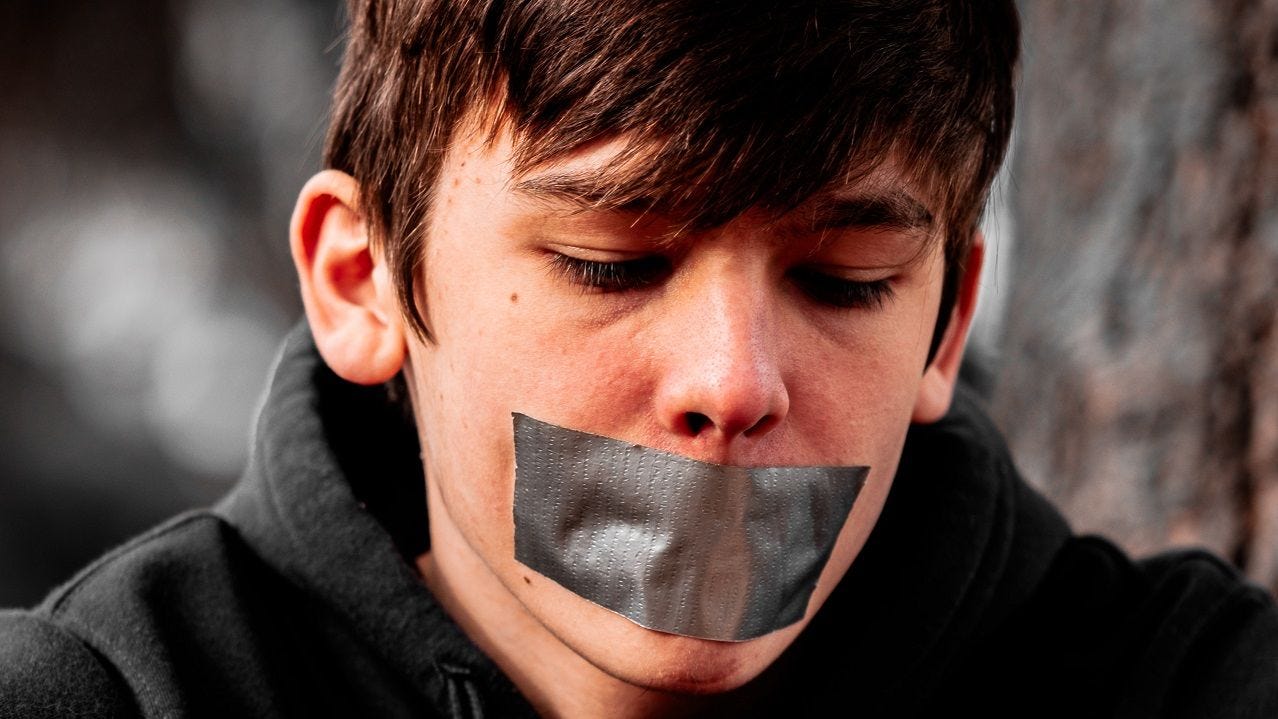Why transactivists should listen to me
Tucked up in their extremist bubble, they wrongly think most people support them, and grossly misunderstand their opposition
Another week, another apology for lateness. But the crazy period of conferences, talks and kerfuffle surrounding them is hopefully coming to an end, and something like normal service will once more resume.
As most readers of this newsletter probably know, last week I spoke at Gonville and Caius College in Cambridge (pictured above), at an event arranged by a fellow of the college, philosophy professor Arif Ahmed, who is an ardent champion of free speech. I don’t propose to say much about how the evening itself went here (I’ll hopefully be saying more elsewhere soon), but to talk instead about that much-contested value.
If this newsletter was forwarded to you, you might like to sign up for free updates. I hope that in the future you might consider subscribing.
Something very strange has happened to the popular conception of free speech—strange on the face of it, that is; I think deep reasons lie behind it. It’s that free speech is in the process of being redefined as something that helps the powerful, and from which the powerless must be protected. In partisan terms that maps, albeit imperfectly, onto thinking of free speech as a right-wing demand—and not just plain old “right-wing”, but “far-right”, even “hateful”.
I suppose most readers of this newsletter will agree, at least roughly, on why this is happening: the rise of an intolerant version of identitarian politics, and one moreover that relies heavily on linguistic policing. But even so, it is strange that society at large has accepted the notion that free speech is for the powerful at face value. Because protections for free speech have always and everywhere been, on balance, protections for the speech of the oppressed.
People with power tend to be able to say what they want, whatever the law concerning speech, and however brilliant or nasty their words. In fact, being able to speak without fearing the consequences is a pretty good definition of privilege. Every civil-rights movement has required powerless people to insist on speaking, and the consequences have often been dreadful for them—arrest, assault, abuse in prison, forced hospitalisation, even murder. And so the single most important reason for protecting “free speech” is to make it easier to speak truth to power, and to make the consequences of such speech less potentially horrific.
As this is forgotten, more and more people seem to think that the only possible reason for wanting speech to be as free as possible is to make it easier to mock and insult the downtrodden. It’s a remarkably impoverished conception of speech that I think says more about those who want to limit it than about those who want to free it.
This goes alongside attempts to define “free speech” itself as narrowly as possible—I’ve been told, including by established journalists who really should know better, that if the constraints aren’t government-imposed, or if they don’t actually land you in jail or get you physically assaulted, then they don’t count as constraints on speech at all. Sometimes such people will add smugly that “freedom to speak is not freedom from consequences”.
All this is profoundly wrongheaded. Okay, so the American constitution bars restraints on speech only when they are imposed by government. But so what? That’s a single country’s laws, not a universal philosophical principle. And the point of protecting free speech is to tie the hands of those with authority and power when it comes to responding to what other people say. In modern democracies, especially in the Anglosphere, “those with authority and power” means not just governments but Big Tech, multinational employers with Americanised ideas of what is allowable to say, and the network of think-tanks, NGOs and charities that shape what becomes equality and employment law and practice. As for “freedom from consequences”, “free speech” means, exactly and precisely, that at least some potential consequences of speaking are taken off the table.
Of course there are plenty of countries where the consequences of speech include imprisonment and violence, and the biggest threat is the government. But the people who may impose penalties on you for speaking aren’t just the government; they’re your employer, your customers and even your fellow workers. Even in dictatorships these are a major deterrent; I remember reading that during Hitler’s rise to power the main reason people joined the Nazi Party or Hitler Youth was to avoid trouble at work for themselves or their families.
In established democracies, the biggest risk of countercultural speech is loss of income. I lost count long ago of the people who have been in touch with me to tell me about disciplinary proceedings, industry blacklisting and outright job loss for the “crime” of saying something moderate and sensible, in a polite and appropriate way, about issues of sex and gender. This continues despite Maya Forstater’s groundbreaking victory in the employment appeal tribunal.
When I hear people dismiss non-government constraints on speech, or say that “cancel culture” should be called “consequence culture”, I know straight away that they personally have never felt a pressing need to say anything that goes against their own in-group consensus, and cannot even imagine doing so. Many of the xkcd cartoons are excellent, but the free-speech one is a rare total misfire—and predictably goes down well with those on the fabled “right side of history”. The cartoon might as well just quote Idi Amin—“There is freedom of speech, but I cannot guarantee freedom after speech”—and be done with it.
I have always cared a lot about free speech, perhaps because I’m not great at social or “white” lies and strongly dislike being forced to say things I don’t believe. I think these traits vary from person to person—some people are much more socially agreeable than I am, and perhaps therefore more attuned to other people’s levels of interest and discomfort. I think such instinctive feelings of revulsion towards the idea of compelled speech and silence constitute a character trait, and not necessarily a good or a bad one. Being unable to say what I think, or being forced to say what I don’t think, gives me a feeling of stifling, a furious sense of powerlessness. I now think a lot of people don’t really feel this, or at least don’t feel it as readily.
I wasn’t willing to get married in church, for example, because I stopped believing in God in my teens. But plenty of people who don’t believe in God have religious weddings, and don’t find that a problem. I’m not saying they’re wrong, just that it wasn’t for me: it would have felt like compelled speech. Something similar probably happens with the new trend to put your pronouns on badges and in email signatures: many people (the pragmatic people, perhaps) shrug inwardly and comply even if they have no truck with the belief system underpinning this display.
But since getting embroiled in the whole sex and gender thing, I realised that when I thought about freedom of speech I had always focused in the wrong place: on the person speaking, and how awful it feels to be silenced or compelled to speak dishonestly or inauthentically. I now think that the personal comfort or discomfort of the speaker is not the main point. The benefits of protecting free speech mostly do not accrue to the person speaking, but to society at large.
The one I want to concentrate on here is that strong norms protecting and promoting free speech make it more likely that you and everyone else you share a country with understand each other. This inevitably requires everyone hearing things they don’t like, indeed that they find painfully offensive (if you think your fellow citizens mostly believe the same things as you do, or at least believe only things you don’t regard as outrageous, wrongheaded and bigoted, then you are living in a fantasy world—and I am certain of this no matter what you believe).
This is as good a place as any to get something out of the way: no one, not even people who call themselves free-speech absolutists, thinks “free speech” means freedom to incite violence, to say things that cause imminent danger to life and limb, or to harass individuals. The canonical example of speech that should be silenced is someone shouting “Fire” in a crowded room. Likewise, if you try to drum up a mob to join you in a lynching, that speech would not be protected: the test is whether you are likely to cause direct, serious harm. And if your speech is not just offensive but repeated and aimed at an individual, it may well be caught by anti-harassment laws.
But whatever your views, that will still leave a lot of potential speech by others that you are bound to find insulting, hurtful and perhaps outright bigoted. My contention is that trying to silence such speech will leave not just the speaker worse off, but you worse off too. In fact, I’d go further: you should actively seek to hear such views. That’s my conception of free speech: not merely as little restraint on speech as possible but a sincere commitment to expressing your views as clearly as you can, and to listening to other people doing the same.
In a democracy, it’s dangerous if large numbers of people are ignorant of the fact that many of their fellow citizens hold attitudes and opinions that they think are challenging, inconvenient, unpleasant, foolish, downright nasty or even crackpot. Remaining ignorant of such views means living in a fool’s paradise. It means missing opportunities to change the world in ways you want, or even to hold on to current aspects of the present you like. If you craft a policy or election campaign it is more likely to miss the mark, because you’ll be responding to strawman opponents rather than real ones. And sometimes, you’ll remain oblivious to threats until it is too late.
Here’s an example. I was working as a journalist in the UK during the 2010 election campaign, during which Gordon Brown met a woman called Gillian Duffy on the campaign trail, whom he described in an unguarded open-mic moment as “just a sort of bigoted woman”. (I wasn’t actually covering British politics at the time, but was following it closely.) Duffy had tried to say to Brown on a walkabout that immigrants were taking jobs from locals who should be working rather than drawing benefits, and that whenever she tried to raise this as an issue she didn’t get a fair hearing: “you can’t say anything about the immigrants because you’re saying that you’re…but all these eastern Europeans what are coming in, where are they flocking from?”
The word Duffy is circling around—the word that’s she left unsaid in that quote in the place indicated by an ellipsis—is clearly the one that’s been used to shame and silence her when she’s previously tried to express concerns about high immigration from eastern Europe. It’s the word “racist”.
And maybe you think she is racist. Maybe you think that’s the only reason someone could have thought that the UK (and Ireland) should have imposed the same restrictions on eastern Europeans entering after the EU expansion of 2004 as every other established EU member did. But whether you agree or disagree with her, she was telling the truth when she said that whenever she tried to express this opinion she was silenced and dismissed as a racist.
And then six years after Brown lost that election the UK voted to leave the EU, with very many of the people who voted to do so expressing precisely Duffy’s views. I was and remain strongly opposed to Brexit, largely because of the harm it was bound to cause in Northern Ireland. But I cannot express how much I rue the fact that people like Duffy found it so hard to get a hearing, and that their views were so rarely represented in mainstream media.
For me, the story of Brexit is that it’s incredibly foolish and counterproductive to call fellow citizens you disagree with bigots and use that as an excuse to silence and ignore them. Such people are still voters, and however repulsive you think another voter’s opinions are (I’m not suggesting Duffy’s are all that terrible), it’s incumbent upon you to find out how many people agree with them, understand why and then, if you still disagree with those opinions and they are widely held, seek to change their minds.
Back in 2010 I had no idea that so many British people felt like Duffy did about immigrants, and I certainly didn’t have any proper understanding of why they felt like that. I wasn’t alone: that failure was replicated across mainstream journalism, and in Westminster too. The result was that arguments for immigration weren’t made that could have been, and policies weren’t adopted that could have allayed people’s concerns.
If politicians and journalists had realised what so many British people actually thought, and why, they could have responded by demonstrating that the immigration policy was the right one, or by changing it, or by ensuring that areas with particularly high immigration saw local services boosted proportionately. Instead David Cameron totally failed to understand the mood of the country, and in a moment of political weakness, solely to get Tory hardliners off his back, called a referendum he thought he could win easily—and lost.
I suppose the counter-view is that by silencing people like Duffy, and making it abundantly clear to anyone who thinks she has a point that she and they are terrible people, you might reduce the number of such people. You could perhaps frighten and shame them out of their views, or at least keep those views out of the public square, where they might infect others. But quite apart from the nasty authoritarianism of that approach, Brexit shows that it’s far from guaranteed to work.
Policy options that large numbers of people privately want but that are deemed unsayable in polite society have a tendency to burst out, sometimes in the form of populist insurgencies, sometimes in the form of concessions from mainstream politicians in moments of weakness, as with the Brexit referendum. And in the privacy of the ballot box, the weapons of shame and silencing no longer work.
Something similar surely happened with the election of Donald Trump. If the Democratic Party had had a better assessment of what Americans thought about it and Hillary Clinton, they might have chosen a better candidate to run against him, and sought to create a policy platform that appealed to more swing voters.
I realise American politics is so utterly dysfunctional that this may be naïve. But at any rate, simply telling people considering voting for him over and over again that he was a clown and they were racists wasn’t exactly a success. I’d far rather have an accurate assessment of what those around me truly think, test my own views against those opinions, and then respond in good faith to the situation on the ground, not to my fantasy of it. And that requires that they are able to speak freely, and that I truly listen.
And so, as always, back to transactivism. One thing I learned on Tuesday night was that my opponents haven’t the faintest idea what I think. The lead editorial in the following issue of Varsity (it’s on p17) is an astonishing illustration. My view, apparently, is that “gender is not a social construct and is immutably tied to sex”—which is such a misrepresentation it’s hard to know where to start.
The extent to which gender is a social construct is no part of my argument. For what it’s worth, if by gender you mean “statistically observable psychological differences between men and women related to the fact that it’s men who impregnate and women who get pregnant and give birth”, then I think gender is not entirely a social construct. If you mean “societal structures and attitudes that position men as central and women as other, and men as dominant and women as subordinate”, then I think it is. And if you mean “claimed gender identity”, I’m totally uninterested in whether it is or isn’t—I don’t think any such nebulous, subjective construct has a place in law or public policy, which are the things that concern me.
As I said on Tuesday night, my thesis is simple, and consists of three points. 1. Sex (in humans) is binary and immutable (because we’re mammals). 2. In some circumstances this fact matters (because of sexed characteristics, such as impregnability, and differences in strength and propensity for violence; these things aren’t affected by declared identities). 3. It matters especially for women (because it is men who are stronger and more violent, and women who bear almost all the costs of reproduction).
I don’t say anything about gender! But the editors at Varsity presumably think I believe something like “men should be manly and women should be womanly because that is the natural order”. It’s frustrating, and even if it doesn’t matter what a bunch of ignorant students think, I’m pretty sure that the same misconception is shared by plenty of people in positions of power.
That all these people misunderstand what I think is not only immensely irritating for me: it deprives them of the chance to re-examine their own views and policy proposals. And most importantly, it leaves them in utter ignorance regarding how many people agree with me. If I’m some sort of tradwife who thinks the sex binary means all women should doll up like 1950s housewives from refrigerator ads and spend their days baking nutritious meals and polishing doorknobs, then I can easily be dismissed.
And the ignorance goes both ways. Of course, genderist views get much more of an airing than mine, and I’ve read an awful lot. Even so, they are so incoherent and varied that I’m not sure I’ve correctly interpreted what the Varsity editors think I think (this is getting meta!). But I can’t find out. That would require some back-and-forth—not just free speech but careful listening, in other words. And what I say apparently makes me too toxic to talk to.
Whenever someone does an opinion poll that is clear about the meaning of words like trans and gender identity, it shows that most people agree with my actual views—which will presumably come as a big land to those Varsity editors and their sympathisers when they realise it, hopefully sooner rather than later. My sympathy with them is limited, since if you refuse to read what I write and then pretend to understand what I think, or stand outside a lecture theatre where I’m speaking and bang pots and pans so loudly that you cannot hear a word, then you can hardly expect to understand what I say.
Nor can you expect to have any idea if the people around you actually disagree with you and agree with me, because they’re not going to tell you. Before my talk a couple of the students who had turned up very early rather than run the gauntlet of protesters told me their friends had no idea they were there, because absolute secrecy was the only alternative to social death.
And so, in a far more extreme version of the Westminster bubble in the run-up to the Brexit vote, the silencing of sex-realist speech enables gender ideologues to believe not only that people like me are stupid and hateful, but also that a pleasing majority in the country at large agrees with them. This is an approach that is doomed to failure—and messy failure, at that.
I’ve often thought that for all transactivists loathe me, in actuality I’m their best friend. Their positions are so crazily maximalist, and they have no idea. I’m trying to end this ignorance, and though they find that hateful, it’s the only way to bring an end to their fool’s paradise in a controlled manner, rather than in an almighty and destructive crash.
If you are signed up for free updates or were forwarded this edition of Joyce Activated, and you would like to subscribe, click below.





